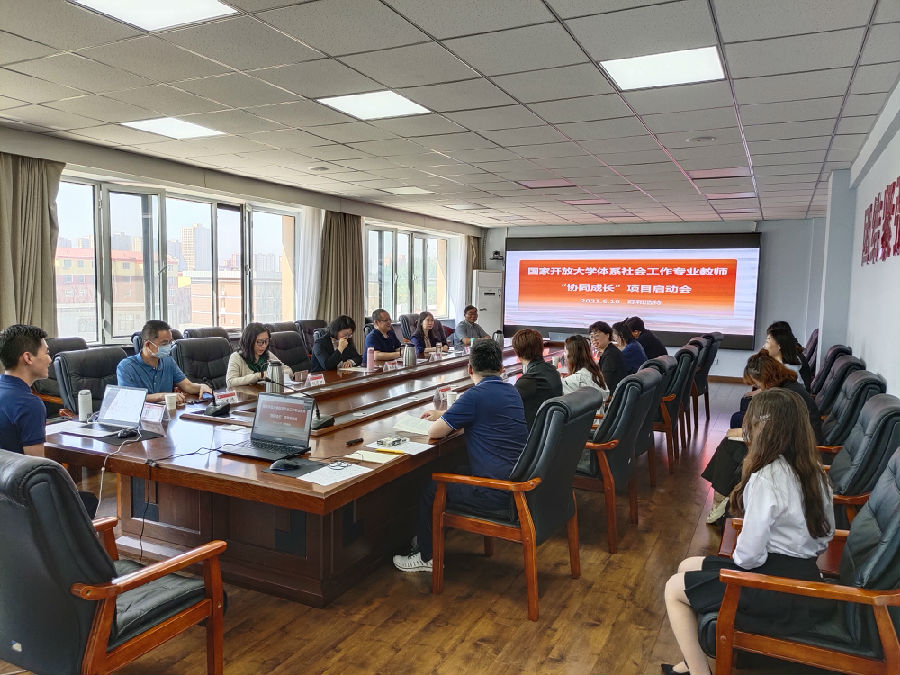 In order to implement the requirements of the OUC Comprehensive Reform Plan, accelerate the improvement of the quality of the Social Work major in the Open University of China (OUC), and strengthen the construction of the faculty of Social Work throughout the system, a launch ceremony for the “Collaborative Growth” project for teachers in the Social Work major in the OUC system was held in Hohhot, Inner Mongolia on the morning of 10 June 2021.
In order to implement the requirements of the OUC Comprehensive Reform Plan, accelerate the improvement of the quality of the Social Work major in the Open University of China (OUC), and strengthen the construction of the faculty of Social Work throughout the system, a launch ceremony for the “Collaborative Growth” project for teachers in the Social Work major in the OUC system was held in Hohhot, Inner Mongolia on the morning of 10 June 2021.
Relevant leaders and teachers from relevant majors from the OUC, the Inner Mongolia Branch, the Chengdu Branch, the Anhui Branch, and the Changchun Branch participated in the launch ceremony on-site. More than 60 teachers from Social Work departments in the OUC system watched a live broadcast of the ceremony online. Liu Xianghong, deputy secretary of the Party Committee and secretary of the Disciplinary Committee of the OUC, delivered a keynote speech.

Mo Shukun, director of the Teaching Department of the Inner Mongolia Branch, delivered a speech on behalf of the school. She introduced the Inner Mongolia Branch’s school-running situation, team structure, and development strategy. As one of the first batch of pilot units for the “Collaborative Growth” project, she hopes to take this opportunity to explore a mechanism for teacher ability. At the same time, it is expected that the project will produce sustainable and reproducible results, and provide a template and model for the OUC’s education system and the Inner Mongolia Branch’s teacher growth and team building.
Liu Xianghong delivered a speech entitled “Bring Together System Strength, Utilise System Advantages, and Build the Social Work Major.” She affirmed the importance of the “Collaborative Growth” project in giving play to the school-running advantages of the OUC system, exploring an innovative model and system for school running, and improving the comprehensive ability of teachers in the system. She put forward five requirements for the implementation of the project. First, adhere to the ideological and political curriculum construction, improve the ideological and political abilities of teachers in the curriculum, and implement the fundamental tasks of fostering virtue and cultivating talent. Second, innovate the system’s teaching model, give full play to its school-running advantages and cohesion, and improve the quality of talent training. Third, successfully complete the pilot project and continue to promote the in-depth development of the teaching reform of the Social Work major. Fourth, speed up the construction of a “double-position” teaching faculty to improve the comprehensive quality of professional teachers. Fifth, support the implementation of the project and promote it in an all-round way. She hopes that through this project, the quality of the faculty of both the OUC headquarters and its branches will improve, assisting each branch to accumulate more successful experiences, create more popular and replicable successful models, and contribute their wisdom to the teaching reform of the OUC.
Gu Xiaohua, vice dean of the Faculty of Political Science and Law of the OUC, proposed that the implementation of the project should be problem-oriented, goal-oriented, and effect-oriented, i.e., it should identify key solutions to problems, determine clear and quantifiable goals, and ensure the effectiveness of the project. He put forward five suggestions to ensure the effect of the project. First, we must establish a community mindset. The members of the project team must grow together, bring together forces from both inside and outside of the system, and participate fully in the project implementation. Second, we must give full play to the advantages of all parties. The headquarters must coordinate policies, projects, and funding. Each branch must formulate specific implementation plans to provide the necessary policy and funding support to ensure the implementation of the project. Subject experts, pragmatic experts, and education/teaching experts should also exercise their own roles. Third, we should promote project implementation using both online and offline models. It is necessary to organise regular offline and online activities. Fourth, we must carry out the project with a research mindset. The “Collaborative Growth” project can also be said to be a teaching reform project. Teachers from the OUC headquarters and branches should implement the project based on their own research problems. Fifth, it is necessary to make timely summaries of project experiences, produce more phased results, and, finally, create golden ideas and good results that can be replicated and promoted throughout the system.
Finally, Wang Hailing, a teacher from Inner Mongolia Agricultural University and vice chairman and secretary-general of the Inner Mongolia Association of Social Workers, gave a lecture entitled “The Project Operation of Social Work Service Organisations.” She focused on achievements in the development of social work in China, the basic situation of social work development in Inner Mongolia, and the project-based operation model and pathway of social work service organisations. She shared her valuable experience of running social work service organisations with teachers from the OUC’s Social Work majors.
The launch ceremony for the “Collaborative Growth” project had a clear theme, abundant content, and pragmatic results. It has laid a solid foundation for the launch and execution of the project, playing a pioneering role in promoting the consensus and strength of the system, fostering the high-quality and characteristic development of the OUC’s Social Work major and the ability of its teachers.
By Huang Qiao, OUC